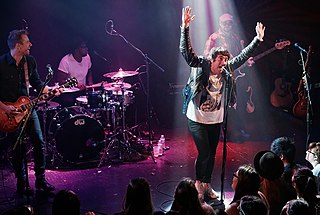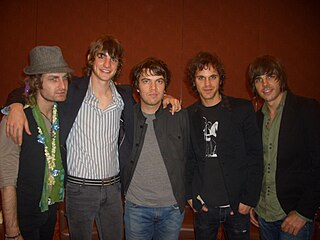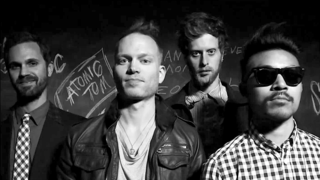Related Research Articles

Simple Plan is a Canadian rock band from Montreal, Quebec. Formed in 1999, the band's current lineup consists of Pierre Bouvier, Chuck Comeau (drums), Jeff Stinco, and Sébastien Lefebvre. David Desrosiers joined the band in early 2000 and left in July 2020.

Vincent Grant Gill is an American singer, songwriter, and musician. He began in a number of local bluegrass bands in the 1970s, and from 1978 to 1982, he achieved his first mainstream attention as lead singer of the soft rock band Pure Prairie League. Gill sang lead on their hit single "Let Me Love You Tonight" in addition to writing several songs of theirs. After leaving Pure Prairie League, Gill briefly played guitar in Rodney Crowell's backing band the Cherry Bombs before beginning a solo career in country music in 1984. Gill recorded for RCA Records Nashville from then until 1988 with minimal success. A year later he signed with MCA Nashville, and he has recorded for this label ever since.

Hoobastank is an American rock band formed in 1994 in Agoura Hills, California, by lead vocalist Doug Robb, guitarist Dan Estrin, drummer Chris Hesse, and original bassist Markku Lappalainen. They were signed to Island Records from 2001 to 2012 and have released six albums and one extended play to date. Their most recent album, Push Pull, was released in May 2018. They have sold 10 million albums worldwide.

Relient K is an American rock band formed in 1998 in Canton, Ohio by Matt Thiessen, Matt Hoopes, and Brian Pittman during their third year in high school and time at Malone University in Canton. The band is named after guitarist Hoopes' automobile, a Plymouth Reliant K car, with the spelling intentionally altered to avoid trademark infringement over the Reliant name.

The Plain White T's are an American pop rock band from Lombard, Illinois, formed in 1997 by high school friends Tom Higgenson, Dave Tirio, and Ken Fletcher, and joined a short time later by Steve Mast. The group had a mostly underground following in Chicago basements, clubs, and bars in its early years.

The Click Five is an American rock band from Boston, Massachusetts. The original members, most of them students at Berklee College of Music, started on January 1, 2004, and played in various local venues. They then quickly got the attention of talent scout Wayne Sharp. The Click Five made their first recording, a two-song demo session, in early 2004 after successful local touring. They released their debut studio album Greetings from Imrie House in 2005. After vocalist Eric Dill left the group, he was replaced by Kyle Patrick who debuted on their second studio album Modern Minds and Pastimes in 2007. Their third studio album, TCV, was released in Asia in 2010 and to the rest of the world in early 2011. The group broke up in 2013. The band is set to return in 2025 to perform at the Playback Music Festival.
The Perishers were a Swedish indie rock band. The band formed in 1997 with six members. The lineup since 2001, has consisted of Ola Klüft, Martin Gustafson, Pehr Åström (bass), and Thomas Hedlund (drums).

A Public Affair is the fifth studio album by American pop singer Jessica Simpson. The album was released on August 26, 2006 in the United States by Epic Records. The album is Simpson's first studio album following her divorce from Nick Lachey and her first release under Epic Records, following her departure from Columbia Records.

"Don't Let the Sun Go Down on Me" is a song written by English musician Elton John and songwriter Bernie Taupin. It was originally recorded by John for his eighth studio album, Caribou (1974), and was released as a single that peaked at number two on the Billboard Hot 100 chart, and reached number 16 on the UK Singles Chart.

Modern Minds and Pastimes is the second studio album by The Click Five. It was released on June 26, 2007. The album contains four singles "Jenny", "Happy Birthday", "Empty" and "Flipside".

"Catch Your Wave" is a song by American power pop band the Click Five. It was released on November 22, 2005, as the second single from their debut studio album Greetings from Imrie House.

Does It Offend You, Yeah? are a British dance-punk band from Reading, Berkshire. They played what was to be their final show on 12 December 2015 at the Electric Ballroom, Camden Town. In September 2021, they announced a new album, titled We Do Our Own Stunts.

Cage the Elephant is an American rock band formed in 2006 in Bowling Green, Kentucky. They moved to England and settled in London in 2008, shortly before their self-titled first album was released. The band currently consists of Matt Shultz (vocals), his older brother Brad Shultz, Nick Bockrath, Matthan Minster, Daniel Tichenor (bass), and Jared Champion (drums). The band's first album was released to much success, spawning several successful radio singles and gaining the band a large following in both the United States and the United Kingdom. It was influenced by classic rock, '90s alternative, blues, punk rock, and funk music. Lincoln Parish served as the band's lead guitarist from their formation in 2006 until 2013, when he left on good terms to pursue a career in producing.

"Unholy" is a song by American hard rock band Kiss, written by Gene Simmons and Vinnie Vincent. Featured on their 1992 album, Revenge, the song is one of the three Vincent co-writes to appear on the album despite the fact that he had been fired from the band 8 years earlier. The release of "Unholy" signaled the return to a heavier sound for Kiss. The song was played live during the Revenge Tour and was included on the 1993 live album Alive III, but did not return to the live Kiss set list until 2004's Rock the Nation Tour.

"Harry Patch (In Memory Of)" is a song by the English alternative rock band Radiohead. The song is a tribute to the British supercentenarian Harry Patch, the last surviving soldier to have fought in the trenches during World War I. Radiohead self-released it on 5 August 2009 as a downloadable single for £1 from their website, with all proceeds donated to the Royal British Legion. It was added to streaming services on Remembrance Day 2016.

Atomic Tom is an alternative rock band originally from Brooklyn, New York, consisting of Luke White, Eric Espiritu, Ethan Mentzer, and Tobias Smith. The band have released two albums, two EPs and a number of singles.

TCV is the third and final studio album by alternative rock band The Click Five. It was released in Asia on November 16, 2010, and was released in Europe the following year.
On the back of the success of the album, Made in England, Elton John went out on tour to promote it. The 1995 leg of the tour covered fifteen European countries, but strangely missing out John's homeland of the United Kingdom. John with his band then crossed the Atlantic Ocean for an extensive tour of the United States, playing forty-two concerts in just under three months, including seven sold out concerts at New York City's legendary Madison Square Garden, which has become a staple venue for any Elton John tour.

Kyle Patrick Dickherber is an American singer, songwriter and producer. He has earned multiple gold records as an artist, and over 150 million streams as a producer & songwriter. He was formerly the lead singer of Boston power pop band The Click Five, which saw numerous radio hits from 2007 to 2010.

SWMRS, pronounced 'swimmers', are an American punk rock band formed in Piedmont, California in 2004 by Cole Becker and Joey Armstrong, with Becker's brother Max Becker joining only a few weeks afterwards. They drew on a mix of influences ranging from the Beach Boys to the Ramones to create their own brand of rock. The band added Travis Neumann in 2009, who later left in 2014 due to creative differences. The band released a demo and a string of EPs from 2008 to 2010. The band released their first album, Don't Be a Dick, on June 14, 2011. The band's second album, Lost at Seventeen, was released on June 11, 2013. They added Sebastian Mueller as the bassist in 2014. The band's third studio album, and their first under the name SWMRS after dropping their former name, Drive North, was released February 12, 2016, via Uncool Records. Drive North was later re-released after the band was signed to record label Fueled by Ramen on October 13, 2016.
References
- 1 2 3 Shawna Ortega (March 6, 2009). "The Click Five's Ben Romans". Songfacts . Archived from the original on November 25, 2009. Retrieved December 3, 2024.
- ↑ Christian Bima (March 23, 2020). "5 songs from The Click Five that will bring back memories of school in the 2000s". IDN Times. Retrieved December 18, 2024.
- ↑ Clarissa Chiang (August 17, 2010). "Five stars with The Click Five". The Urbanwire. Retrieved December 3, 2024.
- ↑ "Single of The Day: The Click Five - Don't Let Me Go". Creative Disc (in Indonesian). June 15, 2011. Retrieved December 3, 2024.
- ↑ @clickfive (January 29, 2011). ""Don't Let Me Go" has entered the TOP 10 on 987FM in Singapore" (Tweet) – via Twitter.
- ↑ End Of Year (2011) Top 100 Songs Countdown On (987 FM, 91.3FM & Power 98 FM)
- ↑ "The Click Five + Jesse Ruben + Alexis Babini". Patch.com . Patch Media. April 21, 2011. Retrieved December 3, 2024.
- ↑ "The Click Five / MTV Exit – Don't Let Me Go". Lojinx. April 15, 2011. Retrieved December 3, 2024.
- ↑ Amy Nachbar (May 17, 2011). "The Click Five at Showcase Live". Patch.com . Patch Media . Retrieved December 3, 2024.
- ↑ @clickfive (November 17, 2011). "We've been nominated for a 2011 Asian Television Award! Very cool - thanks to those who "nominated"" (Tweet) – via Twitter.
- ↑ TCV (album liner notes). Lojinx. 2011.